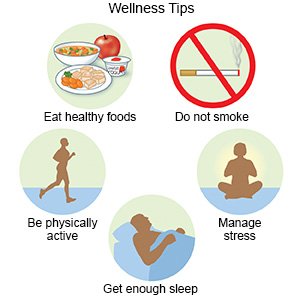Stress
Medically reviewed by Drugs.com. Last updated on Aug 4, 2025.
What is stress?
Stress is a feeling of tension or strain related to the events and pressures of everyday life. Learn to cope and control your stress to help you function in a healthy way. Stress can be caused by many different things, including any of the following:
- Loss of a loved one or a job
- Life events, such as having a baby, buying a house, or getting a divorce
- Medical conditions, such as an acute or long-term illness or a new diagnosis
What are the signs and symptoms of too much stress?
The signs and symptoms of stress are different from person to person.
- Emotional:
- Crying
- Anxiety or nervousness
- Easily upset
- Edgy, angry, or impatient
- Feeling overwhelmed
- Physical:
- Headaches
- Tiredness
- Feeling restless
- Sleep problems
- Heartburn
- Mental:
- Trouble thinking clearly or making decisions
- Memory loss or forgetfulness
- Constant worry
- Social:
- Substance abuse
- Overeating
- Isolation or withdrawal from others
- Decreased desire for sexual intimacy
- Feeling bitter, resentful, or impatient with others
How can I manage my stress?
Learn what causes you stress. Not all stress can be avoided. Instead, change how you cope with stress by doing any of the following:
- Learn relaxation techniques, such as yoga, meditation, or listening to music. Take at least 30 minutes a day to do something you enjoy. This may include taking a bath or reading a book.
- Do deep breathing exercises during times of increased stress. Sit up straight and take a slow, deep breath in through your nose. Then breathe out slowly through your mouth. Take twice as long to breathe out as you do when you breathe in. Repeat this a few times until you feel calmer or more focused.
- Set realistic goals for yourself. Make a list of tasks and prioritize them. Focus on one task at a time.
- Talk to someone about things that upset you. Talk to a trusted friend, family member, or support group. Try to stop yourself when you think negative, angry, or discouraging thoughts.
- Take time to exercise. Start slowly, such as walking 1 to 2 blocks each day. Stretch and relax your muscles often. Ask about the best exercise plan for you.

- Eat a variety of healthy foods. Healthy foods include fruits, vegetables, whole-grain breads, low-fat dairy products, beans, lean meats, and fish.

 |
Treatment options
The following list of medications are related to or used in the treatment of this condition.
Call 911 for any of the following:
- You feel like hurting yourself or someone else.
- You feel you are overwhelmed and can no longer handle things by yourself.
When should I contact my healthcare provider?
- You have trouble coping with your stress.
- Your symptoms cause problems in your relationships.
- You feel depressed.
- You have trouble controlling your anger.
- You have started to use alcohol, illegal drugs, or prescription medicines, or you increase your current use.
- You have questions or concerns about your condition or care.
Care Agreement
You have the right to help plan your care. Learn about your health condition and how it may be treated. Discuss treatment options with your healthcare providers to decide what care you want to receive. You always have the right to refuse treatment. The above information is an educational aid only. It is not intended as medical advice for individual conditions or treatments. Talk to your doctor, nurse or pharmacist before following any medical regimen to see if it is safe and effective for you.© Copyright Merative 2025 Information is for End User's use only and may not be sold, redistributed or otherwise used for commercial purposes.
Learn more about Stress
Treatment options
Care guides
Further information
Always consult your healthcare provider to ensure the information displayed on this page applies to your personal circumstances.
